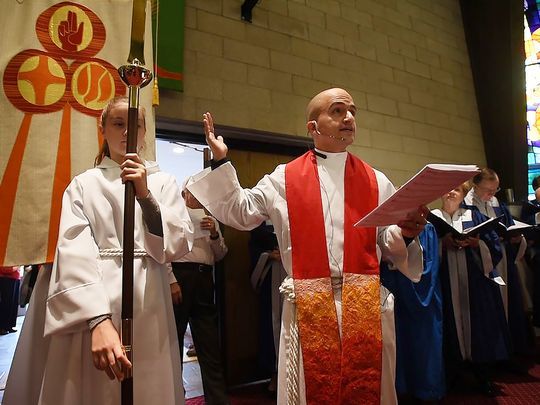1Now all the tax collectors and sinners were coming near to listen to [Jesus.]
Luke 15:1-3, 11b-32
2 And the Pharisees and the scribes were grumbling and saying, “This fellow welcomes sinners and eats with them.”
3 So he told them this parable: 11b “There was a man who had two sons. 12 The younger of them said to his father, ‘Father, give me the share of the wealth that will belong to me.’ So he divided his assets between them. 13A few days later the younger son gathered all he had and traveled to a distant region, and there he squandered his wealth in dissolute living. 14When he had spent everything, a severe famine took place throughout that region, and he began to be in need.
15 So he went and hired himself out to one of the citizens of that region, who sent him to his fields to feed the pigs. 16 He would gladly have filled his stomach with the pods that the pigs were eating, and no one gave him anything. 17 But when he came to his senses he said, ‘How many of my father’s hired hands have bread enough and to spare, but here I am dying of hunger! 18 I will get up and go to my father, and I will say to him, “Father, I have sinned against heaven and before you;
19 I am no longer worthy to be called your son; treat me like one of your hired hands.” ’
20 So he set off and went to his father. But while he was still far off, his father saw him and was filled with compassion; he ran and put his arms around him and kissed him. 21 Then the son said to him, ‘Father, I have sinned against heaven and before you; I am no longer worthy to be called your son.’ 22 But the father said to his slaves, ‘Quickly, bring out a robe—the best one—and put it on him; put a ring on his finger and sandals on his feet. 23 And get the fatted calf and kill it, and let us eat and celebrate, 24 for this son of mine was dead and is alive again; he was lost and is found!’ And they began to celebrate. 25 “Now his elder son was in the field, and as he came and approached the house, he heard music and dancing.
26 He called one of the slaves and asked what was going on. 27 He replied, ‘Your brother has come, and your father has killed the fatted calf because he has got him back safe and sound.’ 28 Then he became angry and refused to go in. His father came out and began to plead with him. 29 But he answered his father, ‘Listen! For all these years I have been working like a slave for you, and I have never disobeyed your command, yet you have never given me even a young goat so that I might celebrate with my friends. 30 But when this son of yours came back, who has devoured your assets with prostitutes, you killed the fatted calf for him!’
31 Then the father said to him, ‘Son, you are always with me, and all that is mine is yours. 32 But we had to celebrate and rejoice, because this brother of yours was dead and has come to life; he was lost and has been found.’ ”
My sermon from the Fourth Sunday in Lent (March 30, 2025) on Luke 15:1-3, 11b-32.
******
Today’s story from the gospel according to Luke is all about lives that were lived – which is weird to hear on a day when, in a few minutes, we’ll be celebrating a life that is basically brand new. Jesus, who regularly used stories to explore deeper truths about faith, grace, hope, and love, shared with us a family whose life together was a bit complicated. We often identify this story by focusing on the so-called prodigal son, whose wasteful and recklessly extravagant behavior eventually brought them home. The end of the story, then, shapes our interpretation of what Jesus’ words were all about. But we can’t get to the end without all the stuff that comes before. The parable of the prodigal son is full of all the juicy stuff we love to analyze and gossip about. But if we’re still at the beginning of our own story – not even realizing our parents still exist when they cover their eyes while playing peekaboo – a story about lives that were lived feels a bit out of place. Yet I wonder if – on this day of beginnings – that the beginning of Jesus’ story reveals the kind of grace that carries us through whatever comes our way.
Now, to notice that, I think we need to remember why Jesus told this story in the first place. He was, at this point in Luke’s version of Jesus’ life, taking his last journey to Jerusalem in a very roundabout kind of way. Jesus regularly made it a point to preach, teach, and heal at various places along the way. And since he – and his friends – were always traveling, finding their next meal was always a bit of a challenge. Jesus rarely ever said no to someone who invited him to eat at their table. And he regularly set a place at his table for anyone who came his way. This, though, caused issues since not everyone who visited Jesus were the kind of people we’d want kneeling next to us at the communion rail. These so-called sinners weren’t simply people who considered themselves good but who occasionally made a mistake. Those breaking bread with him included those who were seen as destroying the very fabric of what it meant to be a faithful community in the first place. The tax collectors often used violence and intimidation to funnel money to the Roman soldiers who occupied the land. Their work required them to violate the religious and cultural expectations that shaped who they knew themselves to be. And Jesus not only took the time to listen and care for them; he also ate with them in a very empathetic and merciful kind of way. Giving that kind of focus to those considered unworthy is something we all struggle with today. Yet instead of telling a literal story about the tables we choose to sit at, Jesus told a story about a father and a son whose table could only be described as completely dysfunctional.
Now we don’t actually know what life was like for this family before the younger one left. Jesus doesn’t tell us if they got along or if any other family were around. All we get in the beginning is a conversation that includes no small talk at all. Rather, the young son went to the day and said “I wish you were dead.” I know that sounds a little harsh since it feels like all he did was ask for money. But the words he chose show how he wanted what he felt he was entitled to once his father was no longer there. Maybe, in our own lives, we’ve said – or imagined – or slammed a door while shouting down the hallway something that sounds a bit similar. Yet the weird thing that makes this entire parable something odd is how, at the beginning, the dad said “okay.” When it comes to Jesus’ stories, it’s always the weird, the absurd, the that-doesn’t-sound-right that provides us the opportunity to deepen our faith. This dad, after his younger child asked for the future to start right now even though his culture didn’t always give younger kids all that much – this dad agreed to do exactly that. And while there might be those among us who have offered – or received – a fairly significant financial gift like a college education, a wedding, a downpayment for a house, or cash to start a business to embrace some kind of new beginning – we don’t usually give the next generation our 401ks and social security payments before they’ve kicked in for ourselves. We, like the father, have our own needs, responsibilities, and callings from God to live out. Maybe, if we had the foresight and luck to know we won’t need our wealth to pay for our future health needs to be a bit more generous than we expect to be. Yet the need to hoard, to be afraid, and to keep what we feel we deserve often limits just how imaginative we get to be. The father had a lot of life yet to live but decided to act as if his future was already over.
Then, what followed was a story full of excessiveness, unfaithfulness, anger, worry, confusion, mercy, and grace. And it was a grace I’m not even sure the father fully understood since, when the younger son came home, the ring, the sandals, the robe, and the fatted calf he gave no longer belonged to him in the first place. When the father accepted a future that no longer included him, the kid who stayed home received everything else. That son’s anger, frustration, and belief the one who didn’t repent shouldn’t then get a spot at the table is about more than them simply being jealous of the love the father showed. Rather, the dad was abundantly over the top with stuff he, in theory, no longer owned. It wasn’t his to give and yet, when an opportunity came to show grace to the graceless, he couldn’t help but live into a future where love abound. The father didn’t create a new beginning for his younger son when he came back after living his life. Instead, he built it at the start and refused to live – or accept – that their future could be anything else instead. Before the younger son left, his seat at the table was already set. And when he finally caught up to that different kind of future, a ring was placed on his finger and new sandals on his feet. That is, I think, one of the ways to imagine what our life with Christ looks like. We are, already, wrapped up in the new beginning he brought us by living a human life, going to the Cross, and living into the new future God has already brought about. We, as the Ones already made – or about to be made – as part of the body of Christ, have a seat at a table where God’s love never ends. This future was given to us not because we’re perfect, holy, or get everything right. Rather, the beginning we have with our God is the beginning of just how human we get to be. What allows us to be ourselves – to live and grow and face whatever comes next – is the grace that keeps the spot at God’s table for us. And since it’s God’s grace that holds the spot open, we get to extend that same kind of grace to those we’d rather push aside. It’s at Jesus’ table where we learn to listen, to care, to change, and be changed by one another and our God. And while Kennedy (who will baptize later) might find different parts of her life feeling like the father, or the older son, or maybe the younger one who just wished that the future she wanted was starting right now, the God who promises to be with her will carry her into a more holy future where Christ’s love is the beginning that never ends.
Amen.



